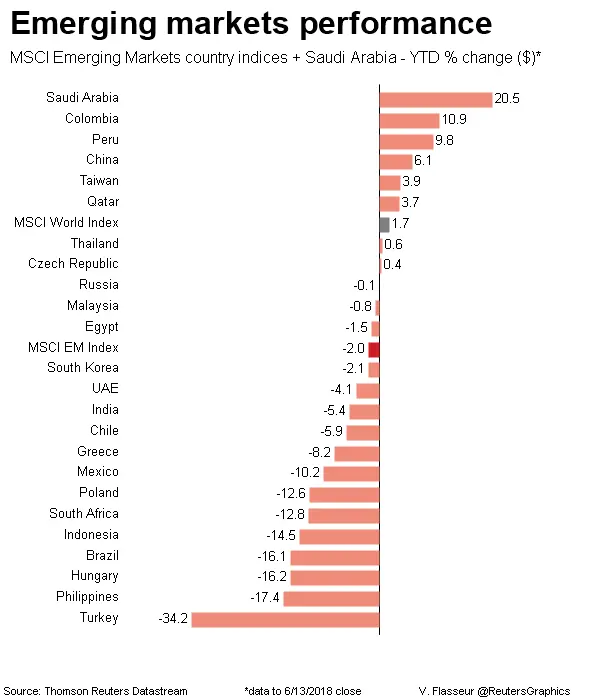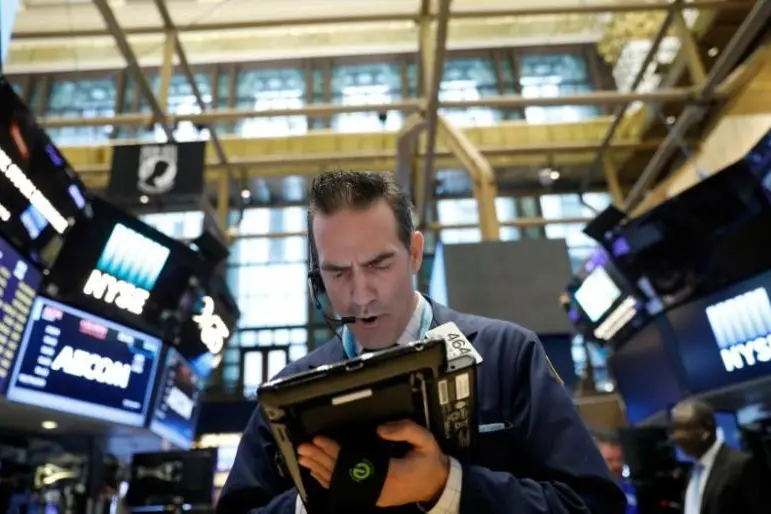PHOTO
The United States Federal Reserve raised interest rates on Wednesday, in a widely expected move.
The Fed raised its benchmark overnight lending rate by one quarter of a percentage point to a range of 1.75 percent to 2 percent.
Global markets
In early trading on Thursday, Asian shares retreated following the Fed’s decision to raise interest rates and amid trade worries between China and the United States.
On Friday, the United States will detail some $50 billion of Chinese goods that might be subject to 25 percent tariffs.
MSCI's broadest index of Asia-Pacific shares outside Japan lost 0.5 percent.
On Wall Street, the S&P 500 lost 0.40 percent and the Nasdaq Composite dropped 0.11 percent.
“The Fed was slightly more hawkish. But at the same time, the Fed is raising rates because of a strong economy and not because of the need to contain inflation. So that might have helped curb market reactions,” Masayuki Kichikawa, chief macro strategist at Sumitomo Mitsui Asset Management, told Reuters.


On Friday, the United States will detail some $50 billion of Chinese goods that might be subject to 25 percent tariff.
Gain a deeper understanding of financial markets through Thomson Reuters Eikon.
Middle East markets
Stock markets in the Middle East were mixed on Wednesday, as trading volumes were lower ahead of the Eid Al Fitr holiday. The Saudi index was closed for the Eid holidays.
Abu Dhabi stocks ended 2.1 percent lower, led by a 3.5 percent drop in First Abu Dhabi Bank as investors took profit in the stock.
The Dubai index also lost early momentum, ending 0.9 percent lower. Emaar Properties declined 1.7 percent.
Dubai Islamic Bank, which had provided support to the market in early trading due to its strong rights issue, also ended 1.7 percent lower.
The Qatar index dropped 0.9 percent, hurt by a 2.2 percent drop in market heavyweight Industries Qatar.
Egypt’s index added 1.5 percent. Commercial International Bank rose almost 1 percent and Medinet Nasr Housing jumped 6.3 percent.
Bahrain and Kuwait’s indices added 0.6 percent and Oman’s index was mainly flat.
Oil prices
Oil prices were pulled down by another rise in U.S. oil production, which hit a weekly record of 10.9 million barrels per day (bpd) last week, according to the Energy Information Administration (EIA) on Wednesday.
Brent crude futures, the international benchmark for oil prices, were at $76.46 per barrel at 0046 GMT, down 28 cents, or 0.4 percent, from their last close.
U.S. West Texas Intermediate (WTI) crude futures were at $66.58 a barrel, down 6 cents from their last settlement.
Currencies
In currency markets, investors’ focus shifted after the Fed’s announcement to the European Central Bank’s policy meeting set to take place later today.
The dollar stood at 110.19 yen, losing steam after hitting a three-week high of 110.85 in the wake of the Fed's decision.
The dollar index has erased all of its gains so far this week and stood at 93.501.
Precious metals
Gold prices edged lower following the Fed’s decision to increase rates.
Spot gold was down 0.1 percent to $1,298.61 per ounce at 0047 GMT. It touched a low of over one week at $1,292.15 an ounce in the previous session.
(Writing Gerard Aoun; Editing by Michael Fahy)
(gerard.aoun@thomsonreuters.com)
A new version of the Trading Middle East newsletter is being launched on June 27, 2018. To keep receiving the newsletter after this date, please subscribe using this link.
Our Standards: The Thomson Reuters Trust Principles
Disclaimer: This article is provided for informational purposes only. The content does not provide tax, legal or investment advice or opinion regarding the suitability, value or profitability of any particular security, portfolio or investment strategy. Read our full disclaimer policy here.
© ZAWYA 2018




















